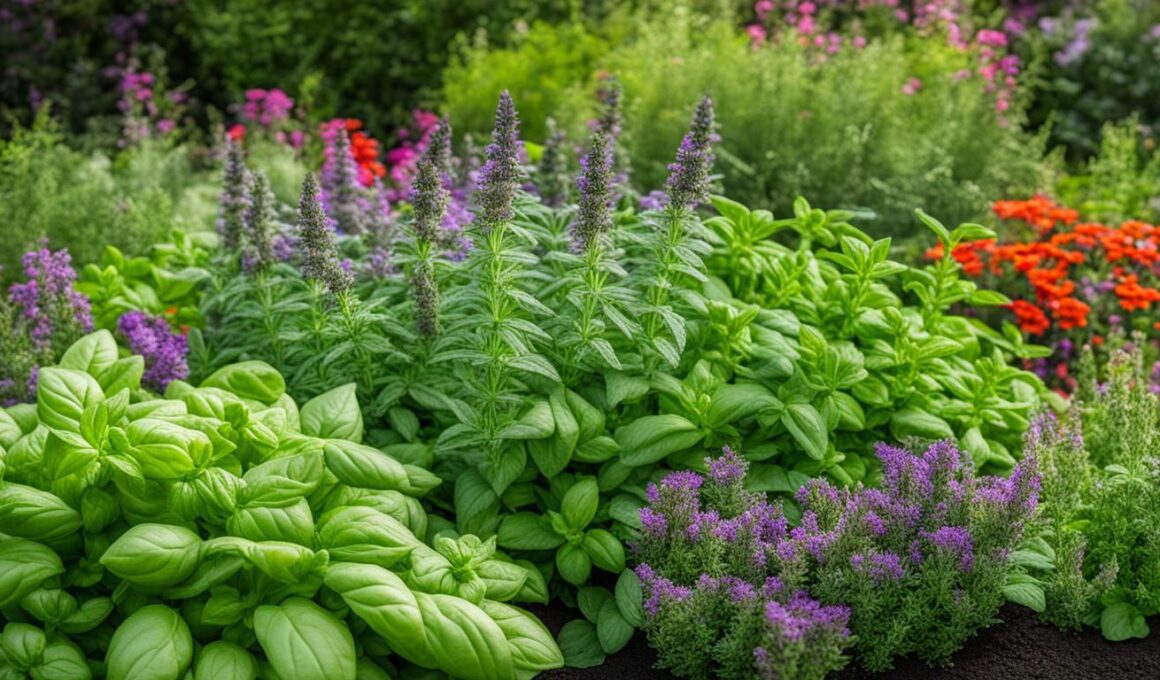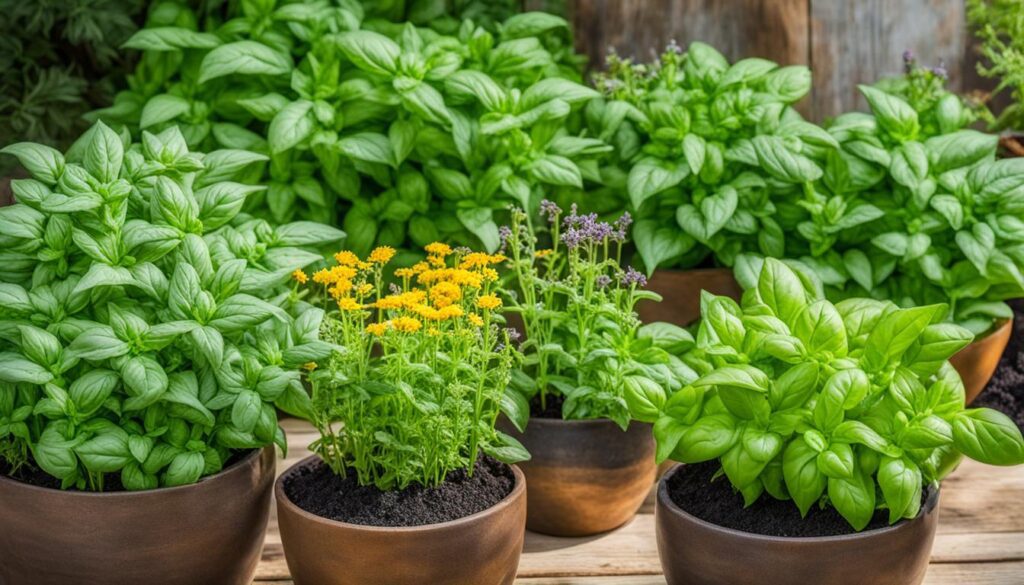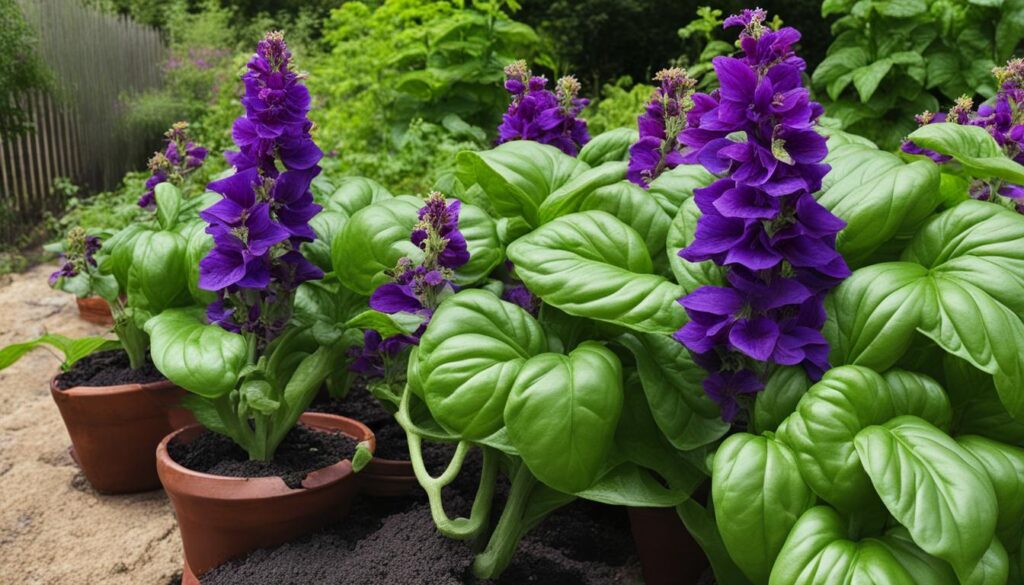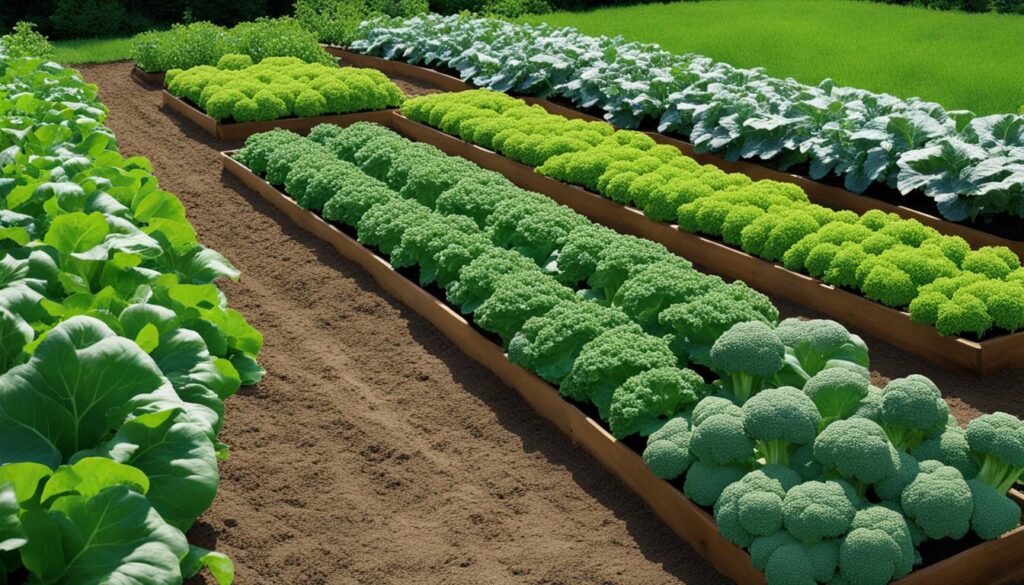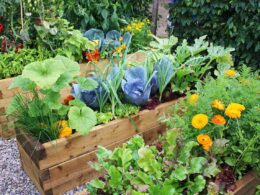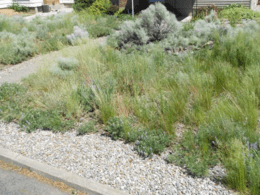Basil is a versatile herb that not only enhances the flavor of dishes but also offers several benefits to the garden. Companion planting with basil can improve pollination, enhance biological control, and act as a natural pest deterrent. There are several herbs that make great companions for basil, and growing them together can promote a healthy and productive garden.
Key Takeaways:
- Growing basil with other herbs in your garden can enhance flavor and offer several benefits.
- Companion planting with basil improves pollination and acts as a natural pest deterrent.
- Herbs like oregano, chives, and parsley make great companions for basil.
- Tomatoes, eggplants, and cole crops are excellent choices to grow with basil.
- Experiment with different plant combinations to find the best companions for your basil and enjoy a thriving garden.
What is Companion Planting and Why is Basil a Great Companion Plant?
Companion planting is a popular gardening technique that involves growing two or more plants together to provide specific benefits to one or more of those plants. It is based on the principle that certain plants have natural affinities for each other and can support each other’s growth and health. Basil is considered a great companion plant due to its many beneficial qualities.
Firstly, basil has natural pest deterrent properties. It emits a strong aroma that repels pests like aphids, mosquitoes, and flies, which helps protect neighboring plants from infestation. By planting basil alongside susceptible crops, you can reduce the need for chemical pesticides and create a more eco-friendly garden environment.
Furthermore, basil attracts beneficial insects such as bees and butterflies. These insects are important for pollination, which is essential for the production of fruits and seeds in many plants. By attracting these pollinators, basil can help improve pollination rates and increase the overall yield of your garden.
“Basil is a giver in the garden, providing numerous benefits while requiring very little in return.”
In addition, basil is compatible with a wide range of plants, making it a versatile companion. It can be grown alongside vegetables like tomatoes, peppers, and eggplants, as well as other herbs like oregano, chives, and parsley. These companion plantings not only enhance the flavor of your dishes but also promote a healthy and balanced ecosystem in your garden.
Overall, basil is an excellent choice for companion planting due to its pest deterrent properties, ability to attract beneficial insects, and compatibility with a variety of plants. By incorporating basil into your garden, you can enjoy the benefits of companion planting and create a thriving and productive garden space.
The Best Basil Companion Plants
When it comes to companion planting with basil, there are several plants and plant groups that make excellent companions. By selecting the right companions for your basil, you can create a thriving garden that not only enhances the flavor of your dishes but also promotes a healthy ecosystem. Here are some of the best basil companion plants:
Tomatoes, Eggplants, and Peppers:
Tomatoes, eggplants, and peppers are all great companions for basil. These vegetables benefit from basil’s pest control properties, as it helps deter pests like thrips, yellow-striped armyworms, and tomato and tobacco hornworms. By growing basil alongside these plants, you can reduce pest damage and improve the overall health of your vegetables.
Cole Crops:
Surprisingly, cole crops like kale, cabbage, and broccoli also receive benefits from companion planting with basil. Basil acts as a trap crop for slugs and snails, which are common pests of these vegetables. It also helps manage the population of imported cabbageworms, another common pest of cole crops. Planting basil alongside cole crops can help deter pests and keep your vegetables healthy.
Lettuce, Root Crops, and Other Herbs:
In addition to tomatoes and cole crops, there are other plants that make great companions for basil. Lettuce, root crops like beets and carrots, and herbs like oregano, chives, and parsley can all be planted alongside basil. These plants not only benefit from basil’s pest control properties but also add diversity and flavor to your garden.
By choosing the right companions for your basil, you can create a synergistic garden that is both productive and beautiful. Experiment with different combinations and observe how these companion plants enhance the growth and flavor of your basil and other vegetables. Enjoy the benefits of companion planting and create a thriving garden ecosystem.
Tomatoes: The Essential Basil Companion Plants
Basil and tomatoes are a match made in gardening heaven. Not only do they complement each other in the kitchen, but they also have a mutually beneficial relationship in the garden. When planted together, basil helps deter pests that can damage tomato plants, resulting in healthier and more productive tomatoes.
One of the pests that basil helps to repel is the tomato and tobacco hornworm. These voracious caterpillars can quickly defoliate tomato plants, causing significant damage. However, the strong aroma of basil acts as a natural repellent, keeping these pests at bay. By interplanting basil with tomatoes, you can reduce the population of hornworms and minimize their impact on your tomato crop.
Another pest that basil deters is the thrip, a tiny insect that feeds on the sap of tomato plants and can transmit diseases. Basil’s strong scent repels thrips, helping to protect your tomatoes from infestation and disease. By growing basil alongside your tomato plants, you create a more resilient and pest-resistant garden.
Basil Companion Planting Benefits for Tomatoes:
- Repels tomato and tobacco hornworms
- Deters thrips and helps prevent disease
- Improves overall plant health and resilience
To maximize the benefits of companion planting, consider planting basil in close proximity to your tomato plants. You can interplant them in the same container or bed, placing basil plants around the perimeter of the tomato patch or even between individual tomato plants. This way, the aroma of basil will surround the tomatoes, providing ongoing pest protection.
| Basil Varieties | Tomato Varieties |
|---|---|
| Genovese Basil | Roma Tomato |
| Thai Basil | Cherry Tomato |
| Lemon Basil | Beefsteak Tomato |
When selecting basil and tomato varieties for companion planting, consider matching their growth habits. For example, if you choose an indeterminate tomato variety that grows tall and requires staking, select a basil variety that will not become overshadowed by the tomato plant. Similarly, if you choose a compact determinate tomato plant, select a basil variety that will not overwhelm it in size.
By harnessing the power of companion planting, you can create a thriving garden where basil and tomatoes work together to deter pests, promote plant health, and provide a bountiful harvest.
Basil and Eggplant: Perfect Companions in the Garden
When it comes to companion planting, basil and eggplant are a match made in gardening heaven. These two plants not only thrive when grown together but also provide mutual benefits that can enhance the health and productivity of your garden. By understanding the benefits of basil and eggplant companion planting and how they deter common pests, you can create a harmonious partnership that yields abundant harvests.
The Benefits of Basil and Eggplant Companion Planting
One of the key benefits of growing basil alongside eggplants is pest deterrence. Basil emits a distinct aroma that repels pests such as thrips and tomato and tobacco hornworms, which are known to damage eggplant plants. By interplanting basil with eggplants, you can effectively reduce the population of these pests and protect the health of your eggplants.
In addition to pest deterrence, basil also attracts beneficial insects such as bees and predatory wasps. These insects play a crucial role in pollination and biological control, helping to increase fruit set and reduce pest populations in the garden. By providing a habitat for these beneficial insects, basil can contribute to a healthy and thriving ecosystem for your eggplant plants.
Creating a Successful Basil and Eggplant Companion Planting Setup
To maximize the benefits of basil and eggplant companion planting, it’s important to plan your garden layout strategically. Plant basil and eggplants together in the same bed or container, ensuring that they have enough space to grow and receive adequate sunlight. Consider planting basil as a border around the eggplant plants or interplanting them in rows.
It’s also important to choose the right varieties of basil and eggplants for your garden. Select basil varieties that have a strong aroma, such as Genovese or Sweet Basil, as these tend to be the most effective in repelling pests. For eggplants, choose varieties that are compatible with your growing conditions and have a good resistance to common pests and diseases.
| Basil Varieties | Eggplant Varieties |
|---|---|
| Genovese Basil | Black Beauty |
| Sweet Basil | Ichiban |
| Lemon Basil | Florida High Bush |
By following these guidelines and maintaining proper care for both plants, you can create a thriving basil and eggplant companion planting setup that benefits both plants and provides you with a bountiful harvest.
Basil Companion Plants: Surprising Benefits for Cole Crops
When it comes to companion planting, basil’s benefits extend beyond mere flavor enhancement. While it’s widely known that basil makes an excellent companion for tomatoes and eggplants, its surprising benefits for cole crops such as kale, cabbage, and broccoli should not be overlooked. By interplanting basil with cole crops, you can effectively deter pests and boost overall plant health.
Basil as a Trap Crop
One of the remarkable benefits of companion planting basil with cole crops is its ability to act as a trap crop for slugs and snails. These common garden pests have a particular affinity for cole crops, often causing significant damage. However, when basil is grown alongside these vegetables, it becomes an irresistible target for slugs and snails, diverting their attention away from your precious cole crops. This natural pest management technique can help protect your plants and prevent infestations.
Controlling Imported Cabbageworms
Imported cabbageworms are another notorious pest that often plague cole crops. These voracious caterpillars can quickly decimate your cabbage and broccoli plants, leaving behind unsightly holes and stunted growth. Fortunately, interplanting basil with cole crops can help manage the population of these pests. Basil emits certain volatile compounds that repel imported cabbageworms, reducing their numbers and minimizing the damage they can cause to your valuable cole crops.
By incorporating basil into your garden bed alongside cole crops, you can create a diverse and harmonious ecosystem that fosters healthy plant growth and minimizes pest infestations. The aromatic presence of basil not only deters slugs, snails, and imported cabbageworms but also adds a delightful fragrance to your garden. Experiment with different varieties of basil and cole crops to find the perfect combination that suits your gardening needs.
Are There Other Herbs That Can Be Planted With Basil Besides Sage?
Basil and sage are great companions in the garden, but other herbs also thrive when you plant basil and sage together. Herbs like thyme, oregano, and parsley benefit from the unique properties of basil and sage, creating a harmonious and productive herb garden.
Conclusion
Companion planting with basil offers a multitude of benefits for your garden. By strategically selecting companion plants, you can create a thriving ecosystem that enhances productivity, flavor, and pest control. Basil, with its ability to deter pests, attract beneficial insects, and improve pollination rates, is an exceptional choice for companion planting.
Basil’s pest-repelling properties make it an excellent companion for tomatoes, eggplants, and cole crops such as kale, cabbage, and broccoli. When grown alongside these vegetables, basil acts as a natural deterrent for common garden pests like thrips and hornworms. This results in healthier and more flavorful produce.
Moreover, the diverse range of companion plants that can be paired with basil expands its benefits even further. Lettuce, root crops like beets and carrots, and herbs like oregano, chives, and parsley all make great companions for basil, contributing to a balanced and harmonious garden environment.
So, why not experiment with different combinations of basil and its companions to find the perfect match for your garden? Embrace the wonders of companion planting, and enjoy a flourishing garden that rewards you with bountiful harvests and natural pest control.
FAQ
What is companion planting?
Companion planting is a gardening technique that involves growing two or more plants together to provide specific benefits to one or more of those plants.
Why is basil a great companion plant?
Basil is a great companion plant because it deters certain pests, attracts beneficial insects, and improves pollination rates.
What are the best basil companion plants?
The best basil companion plants include tomatoes, eggplants, peppers, kale, cabbage, broccoli, lettuce, root crops like beets and carrots, and herbs like oregano, chives, and parsley.
What pests are deterred by basil when planted with tomatoes?
Basil helps deter pests like thrips, yellow-striped armyworms, and tomato and tobacco hornworms that can damage tomato plants.
What pests are deterred by basil when planted with eggplants?
Basil helps deter pests like thrips and tomato and tobacco hornworms that can damage eggplant plants.
How does basil benefit cole crops like kale, cabbage, and broccoli?
Basil acts as a trap crop for slugs and snails that often attack cole crops and helps manage the population of imported cabbageworms, a common pest of these vegetables.
What are the benefits of companion planting with basil?
Companion planting with basil enhances productivity, flavor, and pest control in your garden. It deters pests, attracts beneficial insects, and improves pollination rates.





